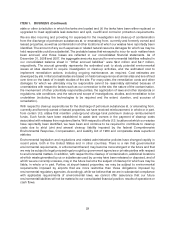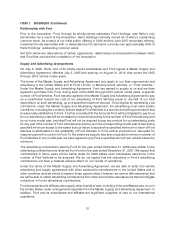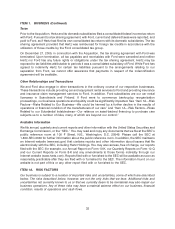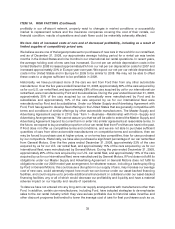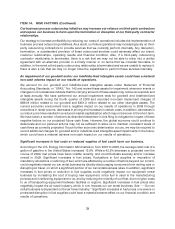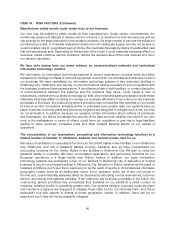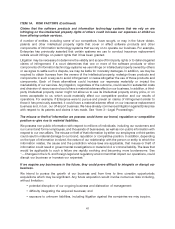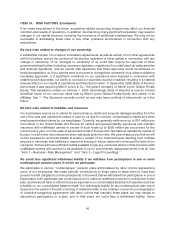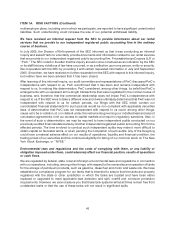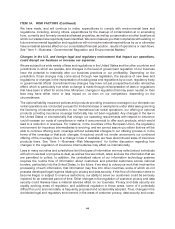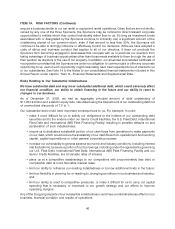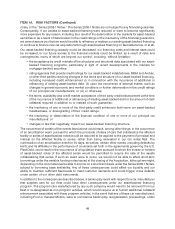Hertz 2008 Annual Report Download - page 59
Download and view the complete annual report
Please find page 59 of the 2008 Hertz annual report below. You can navigate through the pages in the report by either clicking on the pages listed below, or by using the keyword search tool below to find specific information within the annual report.ITEM 1A. RISK FACTORS (Continued)
Our business process outsourcing initiatives may increase our reliance on third-party contractors
and expose our business to harm upon the termination or disruption of our third-party contractor
relationships.
Our strategy to increase profitability by reducing our costs of operations includes the implementation of
business process outsourcing initiatives. As a result, our future operations may increasingly rely on third-
party outsourcing contractors to provide services that we currently perform internally. Any disruption,
termination, or substandard provision of these outsourced services could adversely affect our brand,
customer relationships, operating results and financial condition. Also, if a third-party outsourcing
contractor relationship is terminated, there is a risk that we may not be able to enter into a similar
agreement with an alternate provider in a timely manner or on terms that we consider favorable. In
addition, in the event a third-party outsourcing relationship is terminated and we are unable to replace it,
there is also a risk that we may no longer have the capabilities to perform these services internally.
An impairment of our goodwill and/or our indefinite-lived intangible assets could have a material
non-cash adverse impact on our results of operations.
We account for our goodwill and indefinite-lived intangible assets under Statement of Financial
Accounting Standards, or ‘‘SFAS,’’ No. 142 and review these assets for impairment whenever events or
changes in circumstances indicate that the carrying amount of these assets may not be recoverable and
at least annually. We have performed our annual impairment tests for goodwill and indefinite-lived
intangible assets during the fourth quarter of 2008 and recorded non-cash impairment charges of
$694.9 million related to our goodwill and $451.0 million related to our other intangible assets. The
current economic environment had a negative impact on our results of operations in 2008 through
reductions in rental volume, decreases in pricing and increases in certain costs. In addition, decreases in
our stock price have resulted in a reduced market capitalization which may not recover in the short-term.
We have taken a number of actions as described elsewhere in this filing to mitigate the impact of these
negative factors on our projected future cash flows. However, the global economy could continue to
deteriorate and our planned actions may not be sufficient to allow us to maintain consistent levels of
cash flows as currently projected. If such further economic deterioration occurs, we may be required to
record additional charges for goodwill and/or indefinite-lived intangible asset impairments in the future,
which could have a material adverse non-cash impact on our results of operations.
Significant increases in fuel costs or reduced supplies of fuel could harm our business.
According to the U.S. Energy Information Administration, from 2007 to 2008, the average retail cost of a
gallon of gasoline in the United States increased 15.9%. While a 42.5% decrease is projected over the
course of 2009, fuel prices have been volatile recently, and could fluctuate severely and/or increase
overall in 2009. Significant increases in fuel prices, fluctuations in fuel supplies or imposition of
mandatory allocations or rationing of fuel, which are affected by a number of factors beyond our control,
could negatively impact our car rental business by directly discouraging consumers from renting cars or
disrupting air travel, on which a significant portion of our car rental business relies. In addition, significant
increases in fuel prices or reduction in fuel supplies could negatively impact our equipment rental
business by increasing the cost of buying new equipment, since fuel is used in the manufacturing
process and in delivering equipment to us, and by reducing the mobility of our fleet, due to higher costs
to us of transporting equipment between facilities or regions. Significant increases in fuel prices also
negatively impact the air travel industry, which in turn impacts our car rental business. See ‘‘—Our car
rental business is dependent on the air travel industry.’’ Significant increases in fuel prices or a severe or
protracted disruption in fuel supplies could have a material adverse effect on our financial condition and
results of operations.
39


